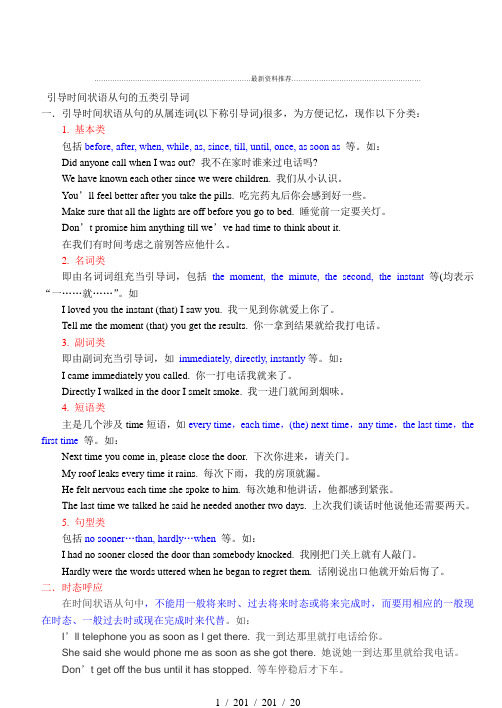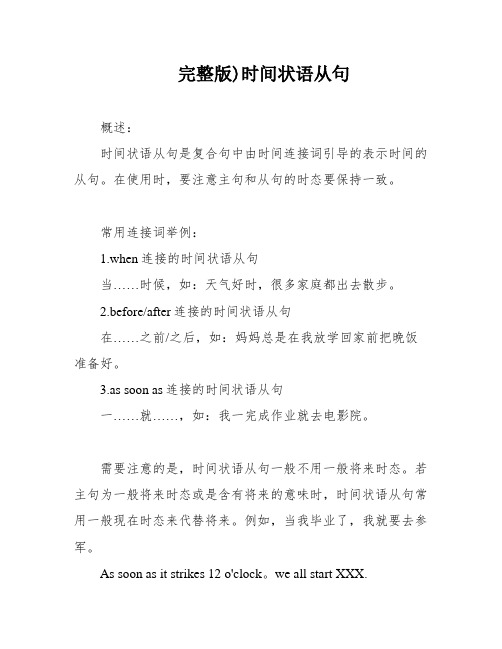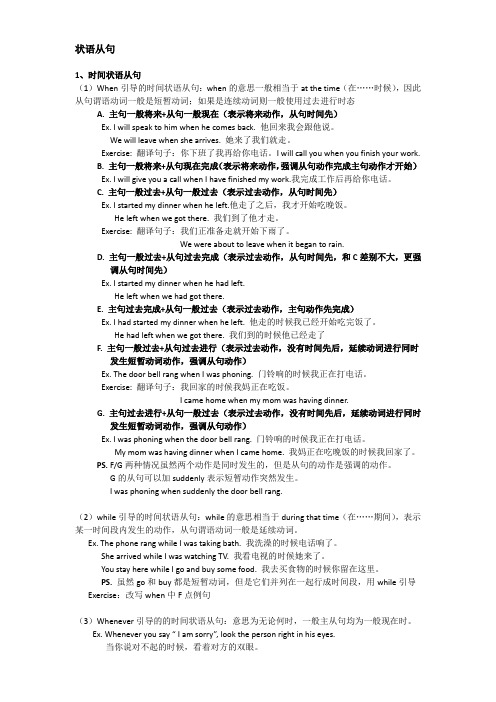时间状语从句英语
时间状语从句

时间状语从句 二,表示“一……就……”时间状语从句
As soon as + 句子 *** 还有三种类型的连词
名词:the moment/ minute/ second +句子
The moment I saw her, I cried out.
副词:immediately/directly/instantly+句子
①表示并列对比 ②“尽管…” While he is strong, his brother is weak. While he is little, he is very brave.
1) 译成“当…时候” 时 : As + 从 句
(两个动作同步进行) 翻译成 “一边…一边… ” We always sing as we walk.
Immediately he came, I told him the news. 句式: no sooner………….than…….
hardly/scarcely.…….when…… Had +主语+done
I recognized you ______ I saw
you at the airport.
be on the point of…
We were about to leave when he came in.
1)译成“当…时候” 时 : while + 从 句
(只能用延续性动词) While the fire broke out,I ….. While I lived here, I… 2)***特殊用法:
A. while B. when
C. as
D. as soon as
The thieves ran away ____ they caught sight of the police.
时间状语从句(完整版)

……………………………………………………………最新资料推荐…………………………………………………引导时间状语从句的五类引导词一.引导时间状语从句的从属连词(以下称引导词)很多,为方便记忆,现作以下分类:1. 基本类包括before, after, when, while, as, since, till, until, once, as soon as 等。
如:Did anyone call when I was out? 我不在家时谁来过电话吗?We have known each other since we were children. 我们从小认识。
You’ll feel better after you take the pills. 吃完药丸后你会感到好一些。
Make sure that all the lights are off before you go to bed. 睡觉前一定要关灯。
Don’t promise him anything till we’ve had time to think about it.在我们有时间考虑之前别答应他什么。
2. 名词类即由名词词组充当引导词,包括the moment, the minute, the second, the instant 等(均表示“一……就……”。
如I loved you the instant (that) I saw you. 我一见到你就爱上你了。
Tell me the moment (that) you get the results. 你一拿到结果就给我打电话。
3. 副词类即由副词充当引导词,如immediately, directly, instantly等。
如:I came immediately you called. 你一打电话我就来了。
Directly I walked in the door I smelt smoke. 我一进门就闻到烟味。
时间状语从句

I waited till the rain stopped. 我一直等到雨停。 He didn’t give me the answer until I asked him the second time. 直到我问了第二次,他才回答我 的问题。
1.当某事正在进行的时候,又发生了另一件事, 这时三个词都可以引导时间状语从句。如: As/when/while I was walking down the street, I noticed a police car. 我在街上散步的时候,看到了一辆警车. 2.当两个延续性动作同时进行的时候,最常用 的是while。如: While my mother was cooking,I was doing my homework. 当我妈妈在做饭时,我正在做家庭作业。
As children get older, they become more and more interested in things around them.
随着孩子年龄的增大,他们就会对 他们周围的事情越来越感兴趣。
Mary sings as she works. 玛丽一边唱歌,一边工作。 She looked behind from time to time as she went. 她一边走一边不时地回头看。
D
11. Write to me as soon as you ____ to B Beijing. A. will get B. get C. getting D. got 12.The meeting didn't start ___ B everyone was there. A. because B. until C. why D. if
完整版)时间状语从句

完整版)时间状语从句概述:时间状语从句是复合句中由时间连接词引导的表示时间的从句。
在使用时,要注意主句和从句的时态要保持一致。
常用连接词举例:1.when连接的时间状语从句当……时候,如:天气好时,很多家庭都出去散步。
2.before/after连接的时间状语从句在……之前/之后,如:妈妈总是在我放学回家前把晚饭准备好。
3.as soon as连接的时间状语从句一……就……,如:我一完成作业就去电影院。
需要注意的是,时间状语从句一般不用一般将来时态。
若主句为一般将来时态或是含有将来的意味时,时间状语从句常用一般现在时态来代替将来。
例如,当我毕业了,我就要去参军。
As soon as it strikes 12 o'clock。
we all start XXX.Upon our arrival。
XXX.4.时间状语从句中使用until表示一个动作一直持续到某一时刻,例如:He waited until all the people left。
我们也可以说I didn't go to bed until Mum came back。
表示直到妈妈回家后我才上床睡觉。
5.当while连接时间状语时,表示主句的行为在从句行为过程之中发生。
从句中要使用持续性动词或状态动词,并且持续性动词通常使用进行时态。
例如:While they were waitingfor the New Year。
they listened to music。
sang songs and had fun.Till and until are used to introduce time clauses in affirmative sentences。
with the main clause verb being a continuous n or state that lasts until the time XXX: XXX。
英语九大状语从句

英语九大状语从句:1.时间状语从句(Time adverbial clause):指定一个时间点或时间段。
例如:I will call you when I get home.(我回家后会给你打电话。
)2.地点状语从句(Place adverbial clause):指定一个地点或位置。
例如:She looked for her keys where she last saw them.(她在上次看到它们的地方找钥匙。
)3.原因状语从句(Reason adverbial clause):提供一个原因或解释。
例如:She didn't come to the party because she was feeling sick.(她因为感觉不舒服所以没有来参加派对。
)4.结果状语从句(Result adverbial clause):表达一个结果或效果。
例如:He studied hard, so he passed the exam.(他努力学习,所以考试通过了。
)5.条件状语从句(Conditional adverbial clause):表示一个条件。
例如:If it rains tomorrow, we will stay indoors.(如果明天下雨,我们会呆在室内。
)6.比较状语从句(Comparison adverbial clause):进行比较。
例如:He sings better than anyone else I know.(他唱得比我认识的任何人都好。
)7.目的状语从句(Purpose adverbial clause):表示一个目的或意图。
例如:I bought groceries so that I can cook dinner.(我买了杂货,这样我就能做晚饭了。
)8.方式状语从句(Manner adverbial clause):描述一个行为或方式。
例如:She speaks as if she knows everything.(她说话的样子好像她什么都知道。
状语从句

状语从句1、时间状语从句(1)When引导的时间状语从句:when的意思一般相当于at the time(在……时候),因此从句谓语动词一般是短暂动词;如果是连续动词则一般使用过去进行时态A. 主句一般将来+从句一般现在(表示将来动作,从句时间先)Ex. I will speak to him when he comes back. 他回来我会跟他说。
We will leave when she arrives. 她来了我们就走。
Exercise: 翻译句子:你下班了我再给你电话。
I will call you when you finish your work.B. 主句一般将来+从句现在完成(表示将来动作,强调从句动作完成主句动作才开始)Ex. I will give you a call when I have finished my work.我完成工作后再给你电话。
C. 主句一般过去+从句一般过去(表示过去动作,从句时间先)Ex. I started my dinner when he left.他走了之后,我才开始吃晚饭。
He left when we got there. 我们到了他才走。
Exercise: 翻译句子:我们正准备走就开始下雨了。
We were about to leave when it began to rain.D. 主句一般过去+从句过去完成(表示过去动作,从句时间先,和C差别不大,更强调从句时间先)Ex. I started my dinner when he had left.He left when we had got there.E. 主句过去完成+从句一般过去(表示过去动作,主句动作先完成)Ex. I had started my dinner when he left. 他走的时候我已经开始吃完饭了。
He had left when we got there. 我们到的时候他已经走了F. 主句一般过去+从句过去进行(表示过去动作,没有时间先后,延续动词进行同时发生短暂动词动作,强调从句动作)Ex. The door bell rang when I was phoning. 门铃响的时候我正在打电话。
时间状语从句的用法及常见错误
时间状语从句的用法及常见错误时间状语从句,是英语中的重要语言结构之一,相信很多学习英语的同学们都有接触过。
它的作用是在主句中描述时间,常常是表达事件发生的先后顺序。
然而,由于语法结构的复杂性以及细节的繁琐,使得许多学习者在真正应用时出现了一些常见的错误。
本文旨在介绍时间状语从句的用法及常见错误,帮助读者加深对此语法结构的理解,更好地运用它。
一、时间状语从句的用法时间状语从句指的是在主句中用来描述时间顺序或时间点的句子,通常由连词when、while、as、before、after、since、until等引导。
例如:- When I arrived at the station, the train had already left.- While I was walking in the park, I met an old friend.- After I finish my homework, I will go to bed.时间状语从句也可以放在句首、句中、句末等不同位置,需要根据语境进行灵活运用。
例如:- When I was young, I used to play football every day.- I met an old friend while I was walking in the park.- I will go to bed after I finish my homework.此外,时间状语从句与各种时态、语态和情态动词搭配使用。
具体来说:1. 在一般现在时中,时间状语从句中通常使用一般过去时来表示过去的时间点或延续时间:- I always watch TV when I have free time.- He speaks Chinese fluently as he has been learning it for many years.2. 在一般过去时中,时间状语从句中通常使用过去完成时来表示更早的过去时间点或动作的完成:- After she had finished her homework, she went to bed.- When I arrived at the airport, the plane had already taken off.3. 在一般将来时中,时间状语从句中通常使用一般现在时或一般将来时来表示将来的时间点或延续时间:- I will call you as soon as I arrive in Shanghai.- She will be very happy when she sees the gift.4. 在现在完成时中,时间状语从句中通常使用过去时间来表示已经完成的动作:- She has visited many countries since she graduated from university.- I haven’t seen him since we went to school.5. 在情态动词中,时间状语从句中通常使用过去完成时来表示动作的完成:- He should have arrived by now.- I would have finished the task if I had more time.二、时间状语从句的常见错误尽管时间状语从句的知识点看似简单,但在实际应用中却存在一些常见错误。
英语中时间状语从句
英语中时间状语从句1、时间状语从句可由when,whenever,while,before,after,until,till,since,now that,once,as soon as等连词引起:Let’s wait until(till)the rain stops.等雨停了再说。
She comes to talk to me whenever she feels lonely.每当她感到寂寞时就来和我聊天。
As I talked,I gained some confidence.我一面谈着一面增强了信心。
Now that I have come back,I want to help you both.现在既然我回来了,我要帮助你们两人。
Once the train is moving,there is no way to stop it.一旦火车开动了就没法址它停下来。
2、由every time,the moment等词引起的从句也可以用作状语Every time I catch a cold,I have pain in my back每回伤风我的背就疼。
Stormy applause broke forth the moment she appeared on the stage她一在台上出现就响起暴风雨般的掌声。
He had impressed me that way the first time I met him.我第一次碰到他时,他就给我这个印象。
Be sure to call on us next time you come to town.下次进城你一定来找我们。
3、instantly,immediately,directly等词也可引起时间状语从句The machine will start instantly you press the button.你一按电钮机器就会开动。
时间状语从句(完整版)
……………………………………………………………最新资料推荐…………………………………………………引导时间状语从句的五类引导词一.引导时间状语从句的从属连词(以下称引导词)很多,为方便记忆,现作以下分类:1. 基本类包括before, after, when, while, as, since, till, until, once, as soon as 等。
如:Did anyone call when I was out? 我不在家时谁来过电话吗?We have known each other since we were children. 我们从小认识。
You’ll feel better after you take the pills. 吃完药丸后你会感到好一些。
Make sure that all the lights are off before you go to bed. 睡觉前一定要关灯。
Don’t promise him anything till we’ve had time to think about it.在我们有时间考虑之前别答应他什么。
2. 名词类即由名词词组充当引导词,包括the moment, the minute, the second, the instant 等(均表示“一……就……”。
如I loved you the instant (that) I saw you. 我一见到你就爱上你了。
Tell me the moment (that) you get the results. 你一拿到结果就给我打电话。
3. 副词类即由副词充当引导词,如immediately, directly, instantly等。
如:I came immediately you called. 你一打电话我就来了。
Directly I walked in the door I smelt smoke. 我一进门就闻到烟味。
完整版)状语从句(9种全)
完整版)状语从句(9种全)状语从句在复合句中起到修饰主句的作用,分为时间、地点、原因、目的、结果、条件、方式、比较、让步等种类。
1.时间状语从句时间状语从句的连接词包括when。
as。
while。
after。
before。
since。
ever since。
as soon as。
once。
till。
until。
whenever。
no sooner…than。
hardly/scarcely。
when。
the moment/minute/instant/second。
every time。
each time。
any time。
the first time。
next time。
last time。
all the time。
by the time。
directly。
immediately。
instantly等。
例如,“一···就···”的句型可以用as soon as或once引导,其中as soon as侧重时间或动作先后衔接紧,而once侧重条件,表示“一旦。
”;on doing sth/on one's + n.作时间状语,例如On arriving at the n。
the thief was arrested.意为“一到达车站,这个小偷就被逮捕了。
”2.地点状语从句地点状语从句的连接词包括where。
wherever。
anywhere。
everywhere等。
例如,I'll go wherever you go.意为“你去哪儿,我就跟你去哪儿。
”3.原因状语从句原因状语从句的连接词包括because。
since。
as。
now that。
seeing that。
considering that等。
例如,Since it's raining。
we'll stay indoors.意为“因为下雨,我们将待在室内。
- 1、下载文档前请自行甄别文档内容的完整性,平台不提供额外的编辑、内容补充、找答案等附加服务。
- 2、"仅部分预览"的文档,不可在线预览部分如存在完整性等问题,可反馈申请退款(可完整预览的文档不适用该条件!)。
- 3、如文档侵犯您的权益,请联系客服反馈,我们会尽快为您处理(人工客服工作时间:9:00-18:30)。
时间状语从句英语
从句用主将从现。
用表示时间的连词连接一个句子作状语,这样的主从复合句就是时
间状语从句。
连接时间状语从句的连接词有:when, before, after, while, as soon as, until, since...... 这里要注意一点的是,如果主句是一般将来时,从句只能用一般现
在时表示将来意义。
引导的时间状语从句的主从复合句中,动作发生在先的用过去完成时,在后的`用过
去时。
表示前面的叙述所没有提到过的信息。
它总是对所描述的事件予以引人注目的强调,意为“这时;突然”;当位于句末的分句具有引种用法时,大致有以下三种情况:
a. when 分句前面的分句采用过去展开时。
例如:
he was still smiling when the door opened and his wife came in. 他正笑着的
时候,门突然开了,他妻子走了进来。
b. when 分句前面的分句采用 was (were) about to, was (were) on the
point 等。
例如:
we were about to start when it began to rain. 我们刚要出发就开始下雨了。
c. when 分句之前的分句用过去顺利完成时,其中 sb had hardly / scarcely
/barely … when 已沦为紧固词组。
例如:
(1) we had hardly fallen asleep when the bell rang. 我们刚刚入睡,铃声就响
了起来。
(2) he had scarcely arrived when he had to leave again. 他刚刚抵达就又必须
离开了。
